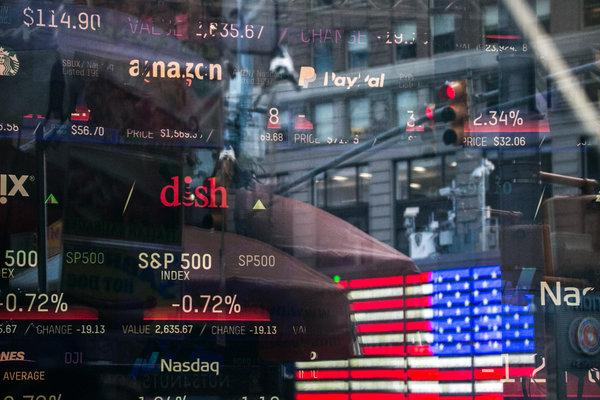
Opinion
Insider Trading Laws Haven’t Kept
Up With the Crooks
The laws around insider
trading are outdated and unclear. They don’t even define “insider
trading.” We have a way to fix that.
By Preet Bharara and Robert J. Jackson Jr.
Mr. Bharara is a former
United States attorney. Mr. Jackson is a Securities and Exchange
commissioner.
Oct. 9, 2018
|

A display at the Nasdaq stock
exchange in New York.
Jeenah Moon for
The New York Times |
America’s insider trading laws are hopelessly out of
date. As a result, fraudsters have evaded law enforcement scrutiny,
and honest market participants are sometimes confused about the rules
of the road.
As
a former United States attorney for Manhattan (Mr. Bharara) and a
current commissioner of the Securities and Exchange Commission (Mr.
Jackson), we have sworn to uphold and enforce the law, to protect the
fairness and integrity of our financial markets against those who
would undermine them. Our work is guided by a simple idea: If you
engage in misconduct that harms investors, you should be held
accountable.
Insider trading cases are of special significance. They
are a manifestation of America’s basic bargain: that the
well-connected should not have unfair advantages over the everyday
citizen. When regulators and prosecutors make a commitment to punish
insider trading, it sends a message that you don’t need special access
to make an honest buck. Fighting insider trading is a refusal to
accept a rigged system.
But the truth is, we often struggle to hold bad actors
accountable for insider trading. In large part, that’s because our
insider trading laws do not clearly define what the standard is.
Unlike most other developed countries, the United
States lacks a law that expressly bans insider trading. Instead, the
government brings insider-trading cases under
a Depression-era
law that generally prohibits “fraud” in securities markets.
As a result, what we now understand as the laws against insider
trading have been written by federal judges in their decisions
interpreting a statute that never mentions the words “insider
trading.” Although there is a commonly accepted idea of what
constitutes insider trading — trading based on material, nonpublic
information associated with a breach of duty — that can be a difficult
legal standard to apply.
The result is a legal haziness that leaves both
investors and defendants unclear about what sorts of
information-sharing or other activities by investors would be
considered insider trading, and what are the acceptable forms of
data-gathering and research that are part of any healthy, functioning
financial marketplace.
The government’s commitment to fairness should be
unambiguous. But, while the government has brought many strong insider
trading cases, a good bit of insider trading law remains ambiguous.
Suppose that a corporate insider gives a friend
nonpublic information — a planned merger that has not yet been
announced, for example — and the friend makes illicit profits trading
on that information. Can the insider be held accountable? The answer,
it turns out, depends on whether a court is convinced that the insider
obtained a “benefit” by tipping her friend — a subject on which
judges
of all
stripes
often
disagree.
Ordinary investors may be surprised to learn that there is any
confusion about this question. And defendants facing potential
criminal liability should have more clarity about what the law is.
Or what if a hacker finds his way into a corporate
computer system and trades on the sensitive information he uncovers?
Will that hacker face charges of insider trading? This time, the
answer depends on whether the information was obtained through
sufficiently “deceptive” practices, like misrepresenting one’s
identity to gain access to information, rather than just mere theft,
like exploiting a weakness in computer code. Again, we think ordinary
investors would be deeply concerned that any trading on the basis of
hacked information might evade punishment. Insider trading law should
not allow the possibility that profits obtained through illicit
trading could fund the cyberattacks that the American government and
companies are constantly facing.
The uncertainty in insider trading law invites debate
over the legality of misconduct that has no place in our markets. But
this is a fixable problem: The law can be updated and made clearer.
Ideally, Congress would take the lead. But
bipartisan
proposals
to update the law have languished for years. The S.E.C., however, does
have the authority to clarify insider trading law. The commission
should use that authority before the next wave of corporate abuses.
That’s why we are announcing the creation of the
Bharara Task Force on Insider Trading, a panel of experts that will
propose new insider trading reforms to protect American investors.
The task force will be led by Mr. Bharara and will
consist of eight distinguished former regulators and prosecutors,
judges, academics and defense lawyers who have agreed to put forth
concrete proposals to update the insider trading law. We hope the
S.E.C., and perhaps even Congress, will consider the group’s
recommendations.
The shoddy state of American insider-trading law
affects everyone. Prosecutors and regulators are stuck
enforcing laws that are ill-suited to 21st-century misconduct. Lawyers
struggle to tell their clients what they can and cannot do within the
bounds of the law. And ordinary Americans are left asking whether
financial markets are stacked in favor of those who skirt the rules.
Our law should leave no doubt about the answer to that question.
Preet Bharara was the United States attorney for the Southern District
of New York from 2009 to 2017. Robert J. Jackson Jr. is a member of
the Securities and Exchange Commission.
© 2018 The
New York Times Company